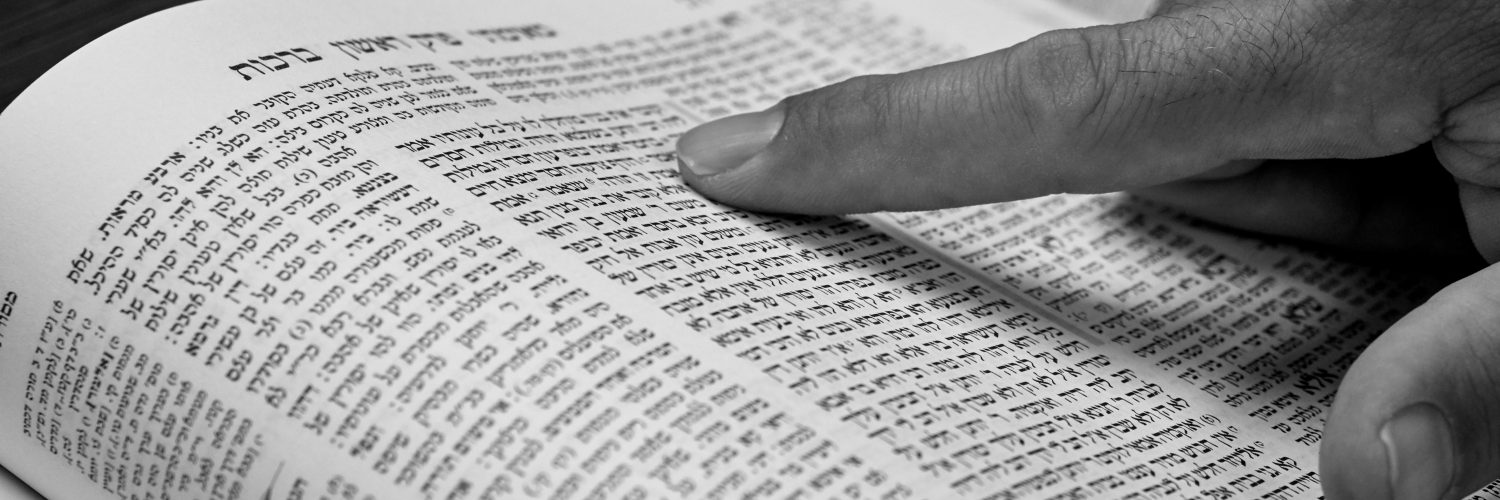The following words of the Rambam (Hilchos Talmud Torah, 1:8) are well known:
Every man of Israel is obligated in Talmud Torah – whether he is poor or rich, whether his body is healthy and whole or afflicted with suffering (“Ba’al Yisurim”), whether young [and vigorous] or very old and exhausted, even a pauper who is dependent on charity, and even one who has a wife and children – he is obligated to set a time for Talmud Torah by day and by night, as the Pasuk says, “v’Hagisa Bo Yomam vaLayla – And you shall ponder it by day and by night.”
Why did the Rambam emphasize that even a Ba’al Yisurim is obligated to study Torah? What is distinct about a Ba’al Yisurim that one might have thought to exempt him?
We will suggest two approaches:
One might have suggested that just as a person is not obligated to spend vast sums of money or invest mammoth efforts to fulfil a Mitzvas Asei,[1] perhaps the same applies to mustering the focus and concentration required to study Torah. Since it represents an excessive effort for a Ba’al Yisurim,perhaps he would be exempt. The Rambam therefore emphasizes that the commandment to study Torah differs from other commandments; unusually great efforts are called for when it comes to Torah study, thus even a Ba’al Yisurim is obligated.
This approach may be supported by the following Pesukim in Parshas Nitzavim (30:11-14):
This Mitzva which I command you today is not concealed from you, nor is it far away. It is not in the heavens that one might say: “Who will go up for us to heaven and take it for us and make us hear it that we might do it?”… For the matter is very close to you; in your mouth and in your heart to do it.
Famously, the Rishonim disagree as to whether these Pesukim refer to the Mitzva of Teshuva or to the general obligation to attain and fulfill the words of the Torah. Rashi takes the second view, interpreting these verses as applying to Torah study:
It is not in the heavens – for if it were in the heavens, you would have to ascend after it and learn it.
Evidently, there are no limits to the efforts a person must expend to study Torah. (This may be contrasted with the Gemara in Chulin 139a which states with regard to the Mitzva of Shilu’ach haKen: “One might have thought that he must search the mountains and hills to find a nest? The Torah states, ‘Ki Yikarei – When it is chanced upon’, when it happens to be before you”. Thus, there are two commandments, one of which does not require him to search the mountains and hills, and the other which even obligates him to ascend to heaven!)
The reason that one is obligated to invest mammoth efforts to study the Torah but not for all other Mitzvos (although one would be handsomely rewarded were he to do so) is seemingly because the Mitzva of Talmud Torah is fundamental to living as a Jew. Learning Torah is not just another Mitzva; it is an essential prerequisite to all of the Mitzvos. If a person has not learned Torah, he will not know how to go about fulfilling the other Mitzvos. Furthermore, the essence of a Jew is defined by his connection to the Torah and to Torah study. Therefore, a person is obligated to push himself to his very limits so as to study it.
A second explanation for the Rambam’s emphasis on a Ba’al Yisurim is that he wanted to teach us that although a Ba’al Yisurim may not have the headspace or strength to delve deeply into the subject material and may only be capable of learning superficially with basic comprehension, he is nonetheless obligated to study the Torah to the extent of his capabilities.
If it is true that a person who cannot delve deeply into the Torah is nonetheless required to study at least superficially, it follows that one who can study Torah in depth and fails do so, preferring to study superficially or to read Tanach instead of engaging in the debates of Abayei and Rava and other practical Halacha, would be guilty of Bitul Torah – neglecting Torah study.
This notion finds expression in the famous question on the Gemara’s statement (Megila 3a), “We set aside Talmud Torah for reading the Megila”. Many Acharonim are puzzled as to why reading the Megila is considered Bitul Torah given that it is a Torah text!
Many answers have been advanced to resolve this question. The most common answer is that when a person is involved with studying Talmud and Poskim to inform practical Halachic conclusions, pausing that study in order to read a work of the Prophets is considered Bitul Torah.
This concept also relates to a famous debate amongst the Poskim with regard to Birchos haTorah – the blessings recited on the Torah (Shulchan Aruch, O. C., 46:9):
He shall not read Pesukim before reciting the blessings on the Torah, even if he says them as supplications. Others say that one should not be concerned, since he only says them as supplications. It is correct to be concerned that the first position is correct. Rema: But the custom is like the second position, for during the days of Selichos we first recite Selichos and then recite blessings on the Torah along with the other blessings. Likewise, every day we recite several verses and supplications upon entering the Shul and then we recite blessings on the Torah.
Without discussing the finer details of this debate, it is apparent that the basis of the question is whether reading Torah verses as supplications, even when comprehending their meaning, is considered Talmud Torah. Perhaps, as long as there is no deep analysis, merely reciting the words of the Torah is not considered to fulfill the Mitzva of Talmud Torah. As such, Birchos haTorah would not be required.
According to the Magen Avraham (50:2), reciting words of Torah without understanding their meaning is not considered Talmud Torah while others disagree. Again, without extensive analysis of the dispute, we may still extrapolate an underlying principle that could potentially exempt a distressed person from studying Torah. Since he will be unable to concentrate, even if he applies himself, he will not be able to study in depth and contemplate what he is learning. Perhaps this was what the Rambam intended to refute. Despite his incapacity, he is not exempt from studying Torah and must study with all his available strength to the extent that he is able.
Thus far we have focused on the words of the Rambam. Now, let us turn our attention to the remarks of the Kesef Mishna who is known to have gone to great lengths to find a source for every statement of the Rambam in the Gemara. The source he brings for this ruling is fascinating:
In the Gemara we find record of many Sages who were sickly and poor, for example R’ Elazar ben R’ Shimon who was sickly (Bava Metzia 84a-b), R’ Chanina ben Dosa (Ta’anis 25a) and Hillel (Yuma 35) who were poor – and they all studied Torah.
He then attributes the Rambam’s contention that a Ba’al Yisurim is obligated in Torah study to the story of R’ Elazar ben R’ Shimon in Bava Metzia. The Gemara relates that R’ Elazar ben R’ Shimon was well-connected with the royal family. Once, he handed over a Jew to the authorities, though he was unsure whether the Jew was truly guilty and whether it was rightful to do so. To atone for this act, he accepted afflictions upon himself:
He accepted afflictions upon himself. At night his attendants would spread out sixty felt bed coverings. In the morning, they would remove sixty basins of blood and pus from beneath him. During the day that ensued, [i.e., each morning], his wife would prepare sixty types of relish made from figs for him, and he would eat them and feel better. His wife would not allow him to go to the Beis haMedrash, so that the Rabbis would not persecute him [for handing over that individual over to the monarchy]. In the evening, he would say to his Yisurim: “My brothers and my friends, come!” In the morning he would say to them: “Go away, due to Bitul Torah”.
Simply put, the Kesef Mishna proves from the fact that R’ Elazar engaged in Torah study despite his agonizing condition that even a Ba’al Yisurimmust study Torah. However, if this is true, his proof is incomprehensible! The Gemara clearly relates that he would seek to expel his suffering so as not to lose out on Torah study. If so, when he did begin to study, he was no longer a “Ba’al Yisurim”! This is more comparable to a person who has the ability to take analgesic medication so as to feel well enough to learn – is there any doubt that he would not have to do so as to study Torah? Further, if this is the case, where is the evidence that even those who are currently suffering must study Torah?
Moreover, the case of R’ Elazar ben R’ Shimon is surely completely different than a usual Ba’al Yisurim since he brought the suffering upon himself. Had he not had the ability to dispel the suffering each morning, he would not have been allowed to willfully inflict suffering upon himself such that he would to cancel his Torah studies! It is only because he could get rid of them that he was allowed to bring them on himself in the first place. If so, we certainly cannot extrapolate from this case to the Ba’al Yisurim!
We are forced to assume that the Kesef Mishneh interpreted this Gemara like the Maharal in Chidushei Aggados and not like Rashi, as cited above. The Maharal explains that the Gemaradoes not mean that R’ Elazar would literally summon his afflictions each night and expel them each morning, but rather that when Hashem saw how R’ Elazar would accept the suffering with love, He offered him a partial reprieve – the sufferings would be intense at night but mild during the day. In other words, although he suffered less during the daytime, he did still suffer throughout the day as well.
(According to this interpretation, many difficulties with this story are resolved, such as why he did not dispel the afflictions at night as well – after all, it is also obligatory to study Torah at night. According to the Maharal’s approach, this question is resolved because he did not actually control the onset and termination of each episode of the suffering).
In this light, the Kesef Mishna’scomments make perfect sense. During the day, while R’ Elazar continued to suffer, albeit with reduced intensity, he pushed himself to study Torah. This is the source of the Rambam’s ruling that a Ba’al Yisurim must extend himself to learn.
Perhaps we may suggest that even according to Rashi’s interpretation, although R’ Elazar would act to remove his afflictions each morning, he did not have the power to dispel them altogether, but rather to reduce them sufficiently to engage in Torah study. Therefore, even when he did study, it was amidst torment and not amidst good health.
May Hashem grant us the privilege to continuously engage in Torah study in robust health and with peace of mind.
[1] As cited in the context of many Halachos. HaGaon Rav Asher Weiss Shlit”a (Minchas Asher, Bereishis 59) brings seven sources for this. Of course, there are Halachic parameters for “a mammoth effort”; not every “inconvenience” is grounds for an exemption.








